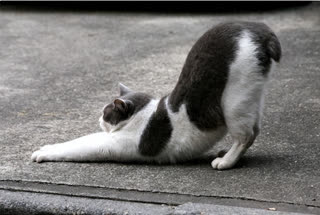Hiding: One of the most common signs of stress in cats is excessive hiding. If your usually outgoing cat suddenly starts spending long periods of time in dark, secluded places like under the bed or in a closet, it could be a sign that they're feeling stressed. This is their way of trying to find a safe space away from whatever is causing them discomfort.
Aggression: Stress can turn a normally docile cat into an aggressive one. They may hiss, growl, scratch, or bite. This aggression can be directed towards humans, other pets in the household, or even objects. For example, a cat that's stressed due to a new pet in the house may lash out at the new addition or at its owner when approached.
Over - grooming or Lack of Grooming: Some cats may start over - grooming themselves when stressed, leading to bald patches or irritated skin. On the other hand, some may neglect their grooming altogether, resulting in a dirty, matted coat. A cat's grooming routine is an important part of its self - care, and any significant change can indicate stress.
Increased Vocalization: A stressed cat may meow more frequently, and the tone of their meows may be different. They could be louder, more insistent, or have a plaintive quality to them. This is their way of trying to communicate their distress.
Changes in Appetite: Stress can cause a cat's appetite to either increase or decrease. Some cats may refuse to eat altogether, while others may overeat. Sudden changes in a cat's eating habits should not be ignored, as they could be a sign of underlying stress.
Litter Box Issues: Cats are very particular about their litter boxes. Stress can cause them to start urinating or defecating outside of the litter box. This could be due to a change in the litter box location, a new type of litter, or the presence of a new pet that makes them feel threatened while using the box.
Increased Heart Rate and Respiration: When a cat is stressed, its heart rate and breathing will increase. You may notice that your cat is panting, even if it hasn't been exercising. In severe cases, this can lead to hyperventilation, which is a serious condition.
Moving House: Moving to a new home is extremely stressful for cats. The unfamiliar smells, sounds, and layout can be overwhelming. It can take them days or even weeks to adjust to their new surroundings. During this time, they may exhibit signs of stress such as hiding, loss of appetite, and litter box problems.
Renovations or Construction: Loud noises, strange people coming in and out of the house, and the disruption of the normal living space due to renovations can all cause stress in cats. Even minor changes like rearranging furniture can be enough to unsettle them.
Introduction of a New Pet or Family Member: Whether it's a new baby, a new dog, or another cat, the introduction of a new member to the household can be a major source of stress for a cat. They may feel territorial and threatened by the new addition, leading to stress - related behaviors.
Chronic Illness: Cats suffering from chronic health conditions such as kidney disease, diabetes, or arthritis are often in pain and discomfort, which can cause stress. The ongoing medical treatments and the way the illness affects their daily lives can also contribute to their stress levels.
Dental Problems: Toothaches and gum disease are common in cats and can be very painful. A cat with dental problems may not eat properly, become irritable, and show other signs of stress due to the discomfort.
Lack of Interaction: Cats are social animals, and they need interaction with their owners. A cat that is left alone for long periods of time without any human contact or playtime can become stressed and lonely.
Bullying from Other Pets: In multi - pet households, if one pet is constantly bullying another, the victimized cat will likely experience stress. This can be especially true if the bullied cat has no way to escape or defend itself.
Provide Hiding Spots: Even in a stress - free environment, cats like to have their own private spaces. Provide them with cardboard boxes, cat caves, or small beds in quiet corners of the house. This gives them a place to retreat to when they feel overwhelmed.
Keep the Litter Box Clean: Scoop the litter box at least once a day and change the litter regularly. Make sure the litter box is in a quiet, accessible location, and if you have multiple cats, provide one litter box per cat plus one extra.
Maintain a Routine: Cats thrive on routine. Feed them at the same time every day, play with them at regular intervals, and keep their sleeping and living areas consistent. This helps them feel secure and reduces stress.
Regular Playtime: Spend at least 15 - 20 minutes a day playing with your cat. Use interactive toys like feather wands, laser pointers, or puzzle toys to keep them mentally and physically stimulated. This not only helps reduce stress but also strengthens the bond between you and your cat.
Gradual Introduction of New Elements: If you're planning to introduce a new pet or make a major change in the household, do it gradually. For example, when getting a new cat, keep the new cat in a separate room for a few days and let the existing cat sniff around the door to get used to the new smell. Then, gradually introduce them to each other under supervision.
Regular Vet Check - Ups: Take your cat to the vet for regular check - ups at least once a year, or more frequently if your cat is older or has health problems. The vet can detect any underlying health issues early on and provide advice on how to manage them to reduce stress.
Watch for Changes: Pay close attention to your cat's behavior, appetite, litter box habits, and overall appearance. Any sudden changes could be a sign of stress or an underlying health problem, and it's important to address them promptly.










